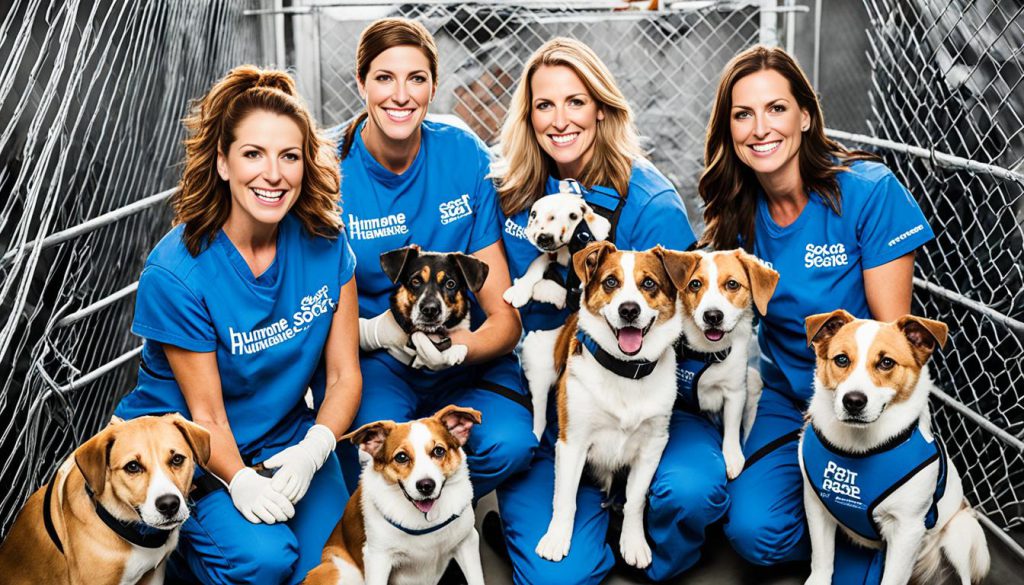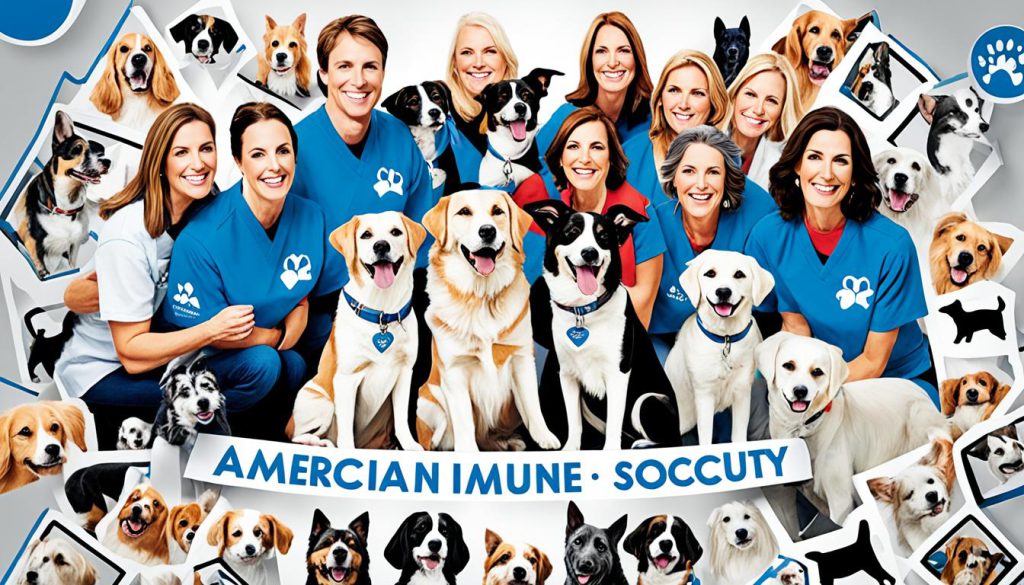How can we show kindness to animals beyond our homes? The world cares more about animal well-being now. This shows as the UN talks about loss of wild animals and species in danger because humans harm their homes. In the US, about 6.3 million pets need shelters yearly. This shows how important animal rescue organizations are. They are the heroes, healers, homes, and guardians of the environment for animals. They work tirelessly to help animals directly, speak up for them, teach kindness, and spread love for animals everywhere.
Incredible stories of success inspire us. Much Love Animal Rescue has given over 3,000 animals new homes since 1999. Best Friends Los Angeles found homes for 27,100 animals in one year. In 2015, San Diego Humane Society made sure no healthy or treatable animal was put down. Karma Rescue and Rocket Dog Rescue have helped thousands and depend on donations to keep going. Muttville Senior Dog Rescue gives special care to older dogs, making sure they find love even in their later years.
Key Takeaways
- Animal rescue organizations serve as critical lifelines for millions of companion animals entering shelters annually.
- Groups like Best Friends Los Angeles and Much Love Animal Rescue have successfully rehomed thousands of animals.
- The San Diego Humane Society reached a significant milestone of zero-kill status for healthy and treatable animals in 2015.
- Organizations such as Rocket Dog Rescue rely 100% on donations to continue their lifesaving work.
- Muttville Senior Dog Rescue ensures that older dogs receive the care and love they need through fostering or adoption.
ASPCA: Leading Efforts in Animal Rescue
Founded in 1866 by Henry Bergh, the ASPCA was the first humane society in the Western Hemisphere. It’s grown into one of the biggest animal welfare groups in the world. Their mission is to stop animal cruelty across the U.S. They do this through a variety of strategies and services.
History and Mission
The ASPCA has hit major milestones in animal welfare. In 2013, their partnership with the New York City Police Department saw animal cruelty arrests soar by 200% in two years. This highlights the ASPCA’s key role in stopping animal cruelty. In 1973, they started offering spay/neuter services for all adopted animals. This was an important move to control the pet population.
Services Provided
Since 1993, the ASPCA has used microchips to help identify animals. This makes it easier for lost pets to find their way back home. The 2015 acquisition of Humane Alliance boosted the ASPCA’s ability to offer quality spay/neuter services. This has helped countless pets through nonprofit shelters.
The ASPCA also works hard in legislative advocacy to defend animal rights. In 2014, they pledged $25 million to help Los Angeles’ homeless pets. Early 2017 studies showed a drop in shelter numbers and a rise in pet adoptions by 18.5%. They also moved the Behavioral Rehabilitation Center to Weaverville, North Carolina. This shows their dedication to giving animals specialized care.
The ASPCA puts a lot of effort into keeping pets in safe, loving homes. They promote pet foster care, giving animals waiting for adoption a temporary place to stay. All of these efforts are part of their mission: to protect and care for animals nationwide.
Best Friends Animal Society: A No-Kill Nation by 2025
Since 1984, Best Friends Animal Society has been working towards a no-kill nation by 2025. Their journey started with a dream among friends and grew into a major force for animals nationwide. They play a crucial role in the no-kill movement, working with communities and forming partnerships.
Community Programs
Best Friends works with over 4,400 shelters and other animal groups across the U.S. They offer programs that tackle pet homelessness at its roots, including low-cost spay/neuter services. In 2023, they even neutered 117 cats in Northwest Arkansas in just one day. Their goal is to keep pets out of shelters and save lives.
Lifesaving Centers and Sanctuaries
Best Friends runs lifesaving centers and sanctuaries for animals waiting for homes. They focus on saving as many animals as possible, giving them second chances. Despite 380,000 dogs and cats being killed in 2023 for lack of homes, Best Friends is working hard to lower this number.
Their work is not just about animals. It also involves partnerships with tech, housing, and businesses to make a bigger impact. Together with shelters and an extensive rescue network, they aim to create a no-kill nation by 2025.
| Year | Animals Saved | Collaborating Organizations | Low-Cost Spay/Neuter Services |
|---|---|---|---|
| 2023 | 42,000 | 4,400 | 117 cats in NW Arkansas (single day) |
| 2024 (Goal) | 55,000 | 5,000 | Expanded services nationwide |
The Humane Society: Fighting the Big Fights
The Humane Society of the United States (HSUS) began its mission in 1954. It has fought for animal welfare for nearly 70 years. Today, it is a recognized leader, earning a four-star rating from Charity Navigator.

HSUS combines legal work with direct action to support animals. It’s backed by the Better Business Bureau’s Wise Giving Alliance and owns Guidestar’s Platinum Seal. The group works hard to make laws better and protect animals every day.
Legislative Advocacy
HSUS is at the forefront, working with lawmakers to create and back animal-friendly laws. They aim to stop the sale of fur and shut down puppy mills in the U.S. Their goal is to end pain for animals everywhere.
They also fight against wildlife killing contests and trophy hunting. Their work covers many areas, showing their deep commitment to animals.
Rescue and Rehabilitation
The Humane Society also runs a huge rescue network. They saved nearly 4,000 beagles from a Virginia lab. These dogs now have a chance at a happy life.
They offer shelter and care for rescued animals. The HSUS helps local animal groups and speaks up for animals nationwide. They are a strong voice for those who cannot speak.
| Statistic | Detail |
|---|---|
| Foundation Year | 1954 |
| Charity Navigator Rating | Four-star |
| Guidestar Seal | Platinum |
| Rescued Beagles | Nearly 4,000 |
The Humane Society stands firm in its commitment to animals. It’s a major force in the fight for a kinder world for animals. This organization leads with compassion and action, working towards a society where all animals are treated with respect.
American Humane Society: First to Serve
The American Humane Society, founded in 1877, stands for the compassionate treatment of animals and kids. They’ve led many important movements and campaigns with their guiding principle, “First to Serve.”

In 1915, they started Be Kind to Animals Week. It’s celebrated in May’s first full week every year. This event reminds us to be kind to all living creatures.
They’ve also been involved in direct emergency animal rescue. For example, in 1920, their Red Star program rescued many Yellowstone National Park elk from dying of hunger. This action showed their dedication to rescue and emergency efforts.
In 1937, during the Mississippi River flood, their Red Star Animal Relief saved and fed numerous stranded farm animals. Then, in 1940, they opened a Hollywood office to fight cruelty in show business.
Over the years, they’ve supported many important causes. One major victory was in 1998 when their efforts led to a ban on vivisection in schools, thanks to a law passed by Congress.
Humane treatment certifications are a key part of their mission. Their certification program ensures the ethical and humane treatment of thousands of farm animals in the US and Canada.
- In 2020, American Humane’s documentary “Escape from Extinction” won Best Environmental Documentary at Doc LA.
- During the pandemic, one million meals and supplies were given to shelter pets.
- During Hurricane Ida, they set up a temp animal shelter for over 120 dogs.
- Rescue teams sheltered 1,700 animals during the Caldor wildfire.
- The organization provided $75,000 in emergency relief grants during the Ukraine conflict.
- Zoos and aquariums certified by American Humane protect nearly 400,000 animals worldwide.
American Humane Society continues to push for better animal welfare. They work to ensure kind treatment in food production and have a big role in emergency rescues. Their fight for the welfare of animals and children shows their lasting commitment to compassion.
Grey Muzzle Organization: Caring for Senior Dogs

The Grey Muzzle Organization is doing great work for senior dogs. They understand the special needs of older dogs. They help these dogs enjoy their later years by providing financial support.
Funding Initiatives
So far, The Grey Muzzle Organization has given out more than $4.6 million in grants. They believe strongly in helping older dogs. The money helps pay for vet care, places for dogs to live, and finding homes for dogs. Many families give money to thank the organization for helping their senior dogs.
- Donations for veterinary care and hospice.
- Funding for orthopedic beds via their Bed Fund.
- Partnership with AmazonSmile, contributing 0.5% of eligible purchases.
- Inclusion in iGive, allowing a portion of online purchases to support the cause.
- Support from the WoofTrax app, enabling donations every time a user walks or bikes.
| Year | Total Grants Awarded | Main Initiatives Funded |
|---|---|---|
| 2015 | $500 – $5,000 | Veterinary Care, Adoption Support |
| 2019 | Up to $10,000 | Permanent Foster Care, Hospice |
| 2021 | $678,580 | Senior Cats Pilot Program, Learning Partnerships |
Foster Care and Adoption
The Grey Muzzle Organization is big on pet foster care and finding homes for senior dogs. They team up with rescue groups all over the country. This teamwork helps senior dogs get adopted into loving homes. It gives these older dogs a chance to be loved again.
“The love, companionship, and joy that senior dogs bring into their adoptive families’ lives cannot be overstated,” shares one grateful family.
The Grey Muzzle Organization tells 26 stories about senior dogs. These stories show how important senior dogs are to families of all kinds. Every donation and every time a dog finds a home or foster care makes a big difference. It helps create a kinder world for our senior pets.
Puppies Behind Bars: Transforming Lives Through Service Dogs
Puppies Behind Bars offers inmates a chance to change through training dogs. This program started over 25 years ago. It helps both people and dogs by being therapeutic. The training creates a strong network of service dogs for different needs.
Program Overview
Inmates train puppies for two years to become service dogs. These dogs help veterans and first responders with PTSD. They also work in explosive detection with law enforcement. Now, the program is in three prisons with 185 trainers. According to various reports, the venture has saved over 680 dogs.
Impact on Inmates and Communities
The impact on inmates is significant, both for rehabilitation and social skills. Programs like Puppies Behind Bars change lives. For example, 39 inmates in California saw their life sentences reduced. No one in the program has reoffended, highlighting its effectiveness.
This effort also helps veterans and first responders with PTSD. One notable case is Jon Grobman, who improved his life significantly through dog training. Such programs build strong communities and improve welfare for both humans and animals.
| Aspect | Data |
|---|---|
| Number of Dogs Saved and Placed | Over 680 |
| Number of Incarcerated Trainers | 185 |
| Prison Expansion | Three prisons: Lancaster, Mule Creek, Vacaville |
| Life Sentence Commutations | 39 Participants |
| Recidivism Rate | None |
| Waiting List | 200 men |
Other states like Florida have adopted similar programs, like TAILS. This shows how service dog training can transform lives and unite communities.
Brother Wolf Animal Rescue: Compassion in Action
Brother Wolf Animal Rescue is in Asheville, North Carolina. They stand out in animal advocacy. They create a positive environment for animals and their staff.
Their mobile clinic is unique. It has been running for about 5.5 years. The clinic operates 4 days a week, doing 15-25 surgeries daily.
It has changed spaying and neutering services. Especially when local clinics dropped their availability drastically.
They are built on values like adaptability and accountability. UNC Charlotte recognized them for amazing staff engagement. This shows their commitment to employee wellbeing.
Benefits for staff include health insurance and more. There are also professional growth opportunities. They focus on making a great workplace.
Staff appreciate using their skills and the supportive culture. They love contributing to something bigger. They feel valued and see personal growth.
They also manage over 2,000 adoptions each year. This shows their huge impact.
Their mobile clinic has adjusted its focus to local areas. This change helps them serve better. It shows their adaptable nature in their compassionate rescue network.
Here’s a snapshot of their mobile clinic’s impact:
| Clinic Operation | Details |
|---|---|
| Years in Operation | 5.5 |
| Days Open per Week | 4 |
| Hours Open per Day | 10 |
| Surgeries Performed Daily | 15-25 |
Animal Welfare Institute: More Than Just Rescue Organizations
The Animal Welfare Institute (AWI) has been a leading voice against animal cruelty since 1951. It is recognized for its in-depth *animal research ethics* research. AWI’s efforts also cover *animal advocacy*, *legislative animal protection*, and *environmental conservation*. They have achieved significant legislative victories, making a big difference in communities.
Advocacy and Education
AWI puts a lot of effort into *animal advocacy* with its educational programs and outreach. Over 90% of their funds go towards programs that support their cause. These programs have helped get important laws passed, like the Pet and Women Safety (PAWS) Act.
AWI has also played a key role in banning animal-tested cosmetics in Illinois. This ban is now a law. They’ve worked with lawmakers in Canada and Ecuador to protect marine animals. This includes laws against displaying and selling whales, dolphins, and porpoises. Their work shows a deep commitment to making the world safer for animals.
3Rs Approach in Research
AWI supports the 3Rs approach—Replace, Reduce, and Refine—in *animal research ethics*. This strategy focuses on finding alternatives to animal testing, using fewer animals, and making experiments less painful. They helped rescue nearly 200 dogs and over 50 cats from a North Carolina lab funded by big pharma.
This rescue effort was sparked by PETA’s complaints and investigations. Thanks to shelters and rescue groups from New Jersey to Florida, all animals found new homes quickly. Amazingly, three-quarters of these animals now have “forever homes.”
Organizations like ASE Haven for Cats, Triangle Beagle Rescue of NC, and Washington Animal Rescue League played crucial roles. Their collective actions highlight AWI’s ability to work with others for positive change.
| Key Initiatives | Outcome |
|---|---|
| Pet and Women Safety (PAWS) Act | Passed by Congress |
| Ban on Animal-Tested Cosmetics | Passed into Law in Illinois |
| Marine Life Protection in Canada and Ecuador | Public Display and Trade of Marine Animals Prohibited |
| 3Rs Approach Adoption | Enhanced Animal Research Ethics |
Conclusion
Rescue groups in the U.S. are key to better care for animals and big wins in animal welfare. Groups like the ASPCA work hard in saving animals and looking into animal cruelty. The Puppy-Friendly Pet Stores program, with over 3,100 stores, helps rescue pets find families.
The Stop Puppy Mills campaign has been a big success, finding over 35,000 shelter pets new homes through pet stores and events. More than 400 partnerships in the Shelter and Rescue Partner program work to improve animal welfare. The Animal Rescue Team and Pets for Life program help animals during emergencies and offer ongoing vet care.
The Shelter Mentorship program supports with grants between $10,000 and $25,000, focusing on community and professional growth for about six months. The Humane Society Veterinary Medical Association boosts vet skills in shelter medicine. These efforts make sure animals find loving homes and a chance at a good future.
Source Links
- https://esadoctors.com/top-animal-rescues-shelters-california/
- https://www.aspca.org/about-us/history-of-the-aspca
- https://bestfriends.org/no-kill-2025/our-priorities-2025
- https://bestfriends.org/
- https://www.whoattackshsus.org/what-the-hsus-does/
- https://www.guidestar.org/profile/53-0225390
- https://www.americanhumane.org/about-us/history/
- https://www.guidestar.org/profile/84-0432950
- https://www.causeiq.com/organizations/american-humane-first-to-serve,840432950/
- https://www.greymuzzle.org/
- https://www.greymuzzle.org/resources/adopting-senior-dog-rescue/join-grey-muzzle-helping-homeless-senior-dogs
- https://www.guidestar.org/profile/26-1965495
- https://reasonstobecheerful.world/paws-for-life-prison-inmate-dog-trainers/
- https://www.bwar.org/career-opportunities/
- https://www.communitycatspodcast.com/empowering-veterinarians-to-combat-pet-overpopulation-insights-from-brother-wolf-animal-rescues-mobile-clinic/
- https://awionline.org/awi-quarterly/2010-fall/awi-rescue
- https://awionline.org/content/what-you-can-do
- https://www.humanesociety.org/resources/how-humane-society-united-states-helps-local-pet-shelters-and-rescue-groups
- https://www.aspca.org/investigations-rescue/rescue-work-and-field-deployments/behind-scenes-animal-rescue

